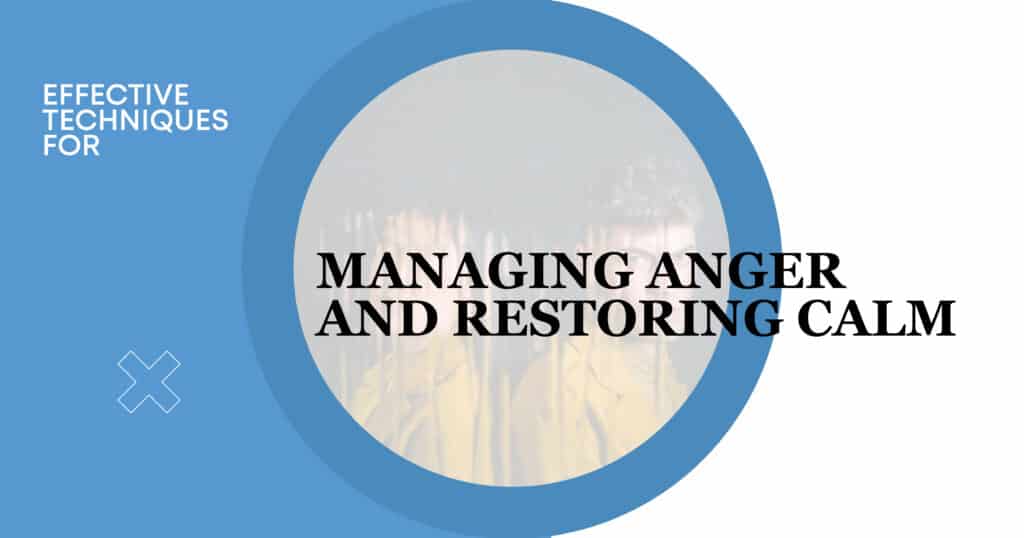Anger is a feeling that is sure to occur, but when uncontrolled, it can damage your relationships, your capacity to make proper judgments, and your physical health. Studies depict that unchecked anger leads to high blood pressure, heart ailments, and even a weak immune system.
Most individuals have difficulties in deciding how to calm down when angry, particularly during emotionally stimulating encounters. Whether it is a workplace conflict that is irritating or a fight with someone you love, the anger cause can be anything, but anger diffusing is an essential part of emotional well-being. Anger management is thankfully a subject that has some effective solutions that may be employed to bring about composure and control before the situation gets out of hand.
This guide will take you through some of the most engaging stress relief activities that will enable you to learn and deal with anger in constructive manners so that you can take back your power and preserve your peace of mind even during the most challenging times.
Identifying the Triggers of Anger
To learn to calm down when angry, you must first understand the reason behind being angry. Emotional landmines are different for everyone. It could be a snide remark, a traffic jam, or the feeling that somebody is not listening to you, but whatever the case may be, identifying what irks you is the initial step towards managing your anger.
Begin by being mindful of the situations when you notice yourself getting temperamental. Is it at stressful meetings? Family arguments? Or when things are not according to plan? Being able to identify these patterns will make you more aware of what causes you to push your buttons and be ready to respond rather than react. In this, mindfulness techniques will be of utmost assistance, as they will teach your brain to recognize emotional signals on the fly.
The next time you identify your triggers, you will develop more effective emotional control mechanisms so that you can gracefully deal with them. This could involve doing relaxation techniques such as deep breathing or taking a time-out mentally. It is important to remember that stress relief activities are not universal, and what may be effective to your friend may not be effective for you. The concept is to find out the methods of anger management that would be more suitable to your character and lifestyle and, therefore, have the power to control your emotional response rather than letting your emotional response control you.
The Physical and Emotional Impact of Anger
Anger does not only reside in your mind – it also manifests itself in your body. When you are angry, your heart beats faster, your muscles become tight, and your breath comes in shallowly. It is also true that with time, uncontrolled anger can lead to guilt, shame, or even depression. That is the reason why it is essential to learn how to relax when you are angry, not only to maintain your mental health, but your physical condition as well. So, let’s see how anger affects the body and the mind.
| Physical Effects | Emotional Effects |
| Increased heart rate | Impulsive behavior |
| Muscle tension | Irritability or rage |
| Shallow, rapid breathing | Difficulty concentrating |
| Headaches or migraines | Heightened anxiety |
| Digestive issues (e.g., stomachaches) | Feeling overwhelmed or out of control |
| High blood pressure | Guilt or regret after angry outbursts |
| Weakened immune system (with chronic anger) | Long-term mood instability or depression |
Techniques for Immediate Anger Relief
When anger attacks, you are likely to think that you are being controlled. However, by having the appropriate tools, you can make the transition gears between explosive to composed rather swiftly. The whole idea of immediate anger relief is to interfere with that emotional buildup before it overwhelms you. It is possible to practice swift anger management techniques so that when an incident occurs, you will remain present and avoid the escalation. The following techniques might help you with it:

- Take 10 slow, deep breaths to reset your nervous system
- Count backward from 20 to give your brain a break
- Splash cold water on your face to shock your system out of a rage state
- Step away from the situation for a brief walk or break
- Squeeze a stress ball or do a quick physical activity like jumping jacks
- Focus on a calming object or image (like a photo or nature scene)
- Use grounding techniques such as naming 5 things you can see, 4 things you can touch, etc.
- Practice mindfulness techniques by focusing on your breath or physical sensations
- Try progressive muscle relaxation, tensing and releasing muscle groups
The Role of Mindfulness in Controlling Anger
Emotional regulation, particularly anger management, is one of the most effective qualities of mindfulness. Using mindfulness techniques repeatedly will allow you to be more in touch with what provokes your anger and how it expresses itself physically and mentally.
When you are living in the moment, you will have the capacity to realize that anger is starting to build up before it erupts. This mindfulness leaves room to relaxing practices and mindful decision making. By way of illustration, when you become aware of your grinding teeth or thoughts running at a million miles an hour, you can take a few minutes to stop and go through deep breathing or whatever anger management technique you have learned before things get completely out of hand.
Mindfulness does not imply not paying attention to your anger. It is accepting it non-judgmentally and trains to react to it with sanity rather than pandemonium.
Long-term Strategies for Anger Management
Although quick fixes are effective in the short term, to stick with it, you should establish habits that can enhance your emotional strength over a long period of time. The long-term techniques of anger management aim to learn the real reasons why you get angry and get control of your emotions so that you remain calm in a situation that would normally trigger your feelings. With the help of daily exercises and mindset shifts, it is possible to decrease the level and rate of anger explosions and to calm down your life, making it more harmonious and balance-filled.
Here are some long-term techniques that support emotional resilience and self-regulation:
- Include deep breathing exercises to deal with stress levels regularly
- Do regular exercises such as walking, yoga, or swimming
- Improve communications with assertiveness training
- Make appointments with a therapist or counselor
- Keep a journal of your feelings to discover the patterns and triggers
- Apply anger meditation to enhance mental health and concentration
- Develop a good support system with friends, family members, or support groups
- Develop a self-care practice featuring relaxation activities and interests.
- Master some relaxation skills, such as progressive muscle relaxation or guided imagery
Seek Professional Help for Anger Issues at Hillside Horizon for Teens
There are cases in which anger is deeper rooted than it can be solved by self-help methods. When your anger is so intense that you feel you cannot control it, when it is occupying your relationships and your everyday life, maybe it is time to consider getting professional help.
At Hillside Horizon for Teens, you will receive caring and professional treatment to enable you to take control again and re-establish your emotional balance. Contact us now to start your voyage to a calm and emotionally stable future.

FAQs
What are effective deep breathing exercises for managing anger?
Box breathing is an effective technique in which you count to 4 as you inhale, hold 4, exhale 4, and then hold 4. The other easy thing that you can do is to breathe diaphragmatically, that is, to breathe slowly and deeply using your belly to trigger the relaxation response of your body.
How can mindfulness techniques help in anger management strategies?
Mindfulness enables you to be more conscious of your emotions when they come so that you can take a step back and respond calmly. It ends the reactivity cycle of anger by starting to think and allowing yourself to feel.
What are some stress relief activities that can reduce anger?
Tension can be released through physical activities such as jogging, dancing, or yoga. There are also creative activities that include drawing, playing a musical instrument, or gardening, which have a calming, therapeutic effect and relieve anger and stress.
How does meditation for anger contribute to emotional regulation skills?
The practice of meditation is beneficial to tame the mind and subdue emotional reactivity by exercising your concentration and awareness. In the long run, it enhances your capacity to deal with awkward emotions and remain composed when situations become stressful.
What are the best calming exercises and relaxation techniques for dealing with anger?
Good calming exercises are progressive muscle relaxation, guided imagery, and focused breathing. A sense of calm can also be restored by listening to calming music, having a warm bath, or by doing some gentle stretching.




